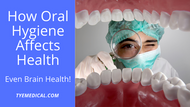Research Says Oral Hygiene Affects Your Health - Even Your Brain Health!
Written by TYE Medical on Feb 7th 2023
Did you know you’re preventing several common diseases when you practice good oral hygiene? Most of us brush and floss for vanity’s sake and to avoid unnecessary dental bills. We want a nice smile, fresh breath, and to avoid those tiny drills. But you might not realize how much you’re doing for your general health when you wrap that floss around your index fingers. Good oral hygiene affects your health far more than you probably realize.
About 700 species of bacteria call your mouth home. Not all of them cause disease, and when kept in check, are largely harmless. But if you neglect daily dental hygiene for too long, those bad bacteria grow out of control and inflame and infect your gums (known as gum disease or gingivitis) and even enter your bloodstream.
So, what’s the big deal? When these oral bacteria escape into other parts of your body, they can contribute to cardiovascular disease, respiratory infections, diabetes, and even Alzheimer's and various dementias. Yes, it’s serious stuff.
Here is a breakdown of recent research and diseases related to poor oral health.
Effects of Poor Oral Hygiene

According to the CDC, 47.2% of adults over 30 and 70% of adults over 65 have gum disease. Often, this condition is linked to poor oral hygiene. When oral bacteria overgrow in your mouth, you can develop conditions like:
- Gingivitis: an early form of gum disease that occurs when bacteria infect your gums
- Periodontal disease (gum disease): develops when an infection inflames your gums and causes bone loss around your teeth
- Tooth decay: when cavities are left untreated and sometimes become infected or abscessed
These oral conditions often develop because of dental hygiene, although not the only cause.
Other Factors that Impact Oral Health
But what if you’re doing everything right but battling gingivitis or gum disease? There are two other factors to consider: medications and medical conditions.
Some medications decrease saliva production or flow. And you need salvia to wash away food particles and neutralize the acids bacteria produce. Essentially, saliva protects your teeth and your body from the multiplying bacteria in your mouth.
Medications that limit your saliva flow include:
- Antihistamines
- Decongestants
- Painkillers
- Diuretics
- Antidepressants
Certain medical conditions like HIV/AIDS and diabetes can make you more prone to infection, even oral infections. And conditions that cause dry mouth, including hypothyroidism or autoimmune disease like Sjogren's can also put you at greater risk for gum disease even if your oral hygiene is on point.
What Science Says About Oral Health and Your Brain

A large 2020 study published in the Journal of Alzheimer’s Disease links the oral bacteria that causes gum disease to the development of Alzheimer’s and dementia. In the study, patients were examined for signs of gum disease and tested for antibodies to specific oral bacteria. After up to 26 years of follow-up, researchers discovered that those who had gum disease and oral infections at the beginning of the study were consistently more likely to develop Alzheimer’s or other dementias during the course of the study.
Oral Bacteria Found Inside Brain Tissue
Another study went a step further and identified strains of oral bacteria inside the brain tissue of Alzheimer’s patients, suggesting an even stronger link. Other research has backed this up and even identified the strain as Porphyromonas gingivalis.
Once this bacteria from your mouth arrives in the brain, it releases enzymes that destroy nerve cells and cause memory loss. Over time, this can lead to Alzheimer’s. For more definitive proof, scientists examined the brains of 53 people who died from Alzheimer’s and high levels of the bacteria-produced enzyme in almost all of them.
Other Lifestyle Factors to Reduce Alzheimer’s Risk
Oral hygiene can positively affect your health when you brush and floss regularly and have professional cleanings. You can reduce your risk of many diseases, including Alzheimer’s with good oral care.
But other controllable lifestyle factors can also determine your likelihood of developing Alzheimer's and dementias. About 40% of Alzheimer’s cases are due to lifestyle risk factors that could have been changed to prevent the disorder. These include:
- Smoking
- Diabetes
- Poor diet
- High blood pressure
- Obesity
- Alcohol consumption
- Depression
- Low-levels of brain stimulation
While no one can completely prevent Alzheimer’s, some manageable lifestyle choices can decrease your likelihood for developing the condition.
Poor Dental Hygiene Increases Risk of Cardiovascular Disease

The connection between your heart health and oral health is less understood. But most agree there is an apparent link between gum disease and heart health. A common theory suggests that when oral bacteria escapes into your bloodstream (usually through inflamed or infected gums), it sets off your immune system and triggers inflammation.
This bacterial inflammation promotes plaque growth in your arteries, contributing to cardiovascular disease or atherosclerosis (hardening of the arteries). Inflammation can even loosen plaque and put you at risk for stroke.
Oral bacteria even affect people with heart valve disease or valve replacement. The bacteria that travel from your mouth to your bloodstream eventually pass through the heart and can infect the valves. Your cardiac surgeon may even advise you to see your dentist before having heart valve surgery.
Poor Oral Health Promotes Respiratory Infection
Another way oral hygiene affects your health when bacteria spreads to your lungs. If you have gum disease or any oral infection, even an abscessed tooth, the bacteria can be inhaled into your lungs or travel there through your bloodstream. As the bacteria infects your lungs, it can cause pneumonia, respiratory infections, acute bronchitis, and even COPD.
Gum Disease Linked to Increased Risk of Diabetes
It’s well understood that diabetes increases your risk of gum disease, because it increases your risk of all types of infections. But the reverse is also true. Having gum disease makes you more susceptible to developing diabetes.
Gum disease is essentially inflamed gums. Inflammation anywhere in your body triggers the stress hormone cortisol that raises blood sugar levels. If you live in a prolonged or chronic state of inflammation, your blood sugar levels remain elevated for longer. This makes you notably more susceptible to diabetes.
Gum Disease Makes Rheumatoid Arthritis More Likely

If you have gum disease, you’re four times more likely to develop rheumatoid arthritis, according to the National Rheumatoid Arthritis Society. It’s so surprising, since both of these conditions have their roots in inflammation. The bacteria that causes gingivitis can spread to your bloodstream and trigger inflammation throughout your body. Widespread inflammation is a major risk factor for rheumatoid arthritis.
Poor Oral Health Can Increase Risk of Kidney Disease
Your kidneys also have a very negative reaction to chronic inflammation. If oral bacteria infects your kidneys, producing chronic inflammation, it can begin to affect kidney function. In time, you can develop kidney disease.
Kidney disease affects more than just your kidneys. It’s a serious health condition that also impacts your bones, heart, and blood pressure. It’s not uncommon for people with poor oral health to also have kidney disease, which can be fatal if it causes kidney failure or even cardiovascular disease.
What Is Good Oral Hygiene?

Generally speaking, you can improve your oral and overall health when you:
- Brush at least twice daily
- Floss daily
- Use mouthwash after brushing (to rinse away particles and kill bacteria)
- Limit sugar, especially sugary beverages
- Replace your toothbrush every three to four months or sooner if needed
- Have regular dental cleanings
Although not startling advice, the above prescription can help you improve more than just your oral health. Good oral hygiene affects your health in various positive ways.
How Gum Disease Develops

Exactly how do bacteria in your mouth wreak such havoc on your teeth, gums, and general health?
You’ve probably seen enough toothpaste commercials to know about plague. It’s yucky. It’s bad. It will cause cavities. But dental plaque comes from bacteria. If you don’t regularly brush and floss your teeth, the bacteria set up residence and produce the sticky substance known as plaque that clings to your teeth.
If not removed through brushing or a hygienist, plaque can irritate your gums and trigger gingivitis (the early stage of gum disease). But if the plaque remains on your teeth for too long, it hardens into tartar and requires professional dental instruments to remove it.
If tartar lingers on your teeth, you reach the next stage which is periodontal disease (also known as gum disease). It’s a greater level of gum infection, and if it’s not treated, it can cause tooth loss.
The Oral-Gut-Brain Axis

Your mouth is a primary gateway to your body. Whatever enters or grows within its caverns has access to the rest of your body. The connection between your mouth and brain is a more recent area of study and has already begun to help people prevent and manage related conditions.
But an even newer area of research involves the link between your mouth, “gut,” and brain. Your gut is generally a reference to your small intestines where the most robust digestion and nutrient extraction takes place.
The Oral-Gut-Brain axis basically describes how these three key areas of your body communicate. Communication runs both ways along the oral-gut axis and the gut-brain axis. Disturbances in one area affect the others even before bacteria travel from through the bloodstream. This is just another way to understand how connected our bodily systems are, why good oral health is foundational to overall health.


